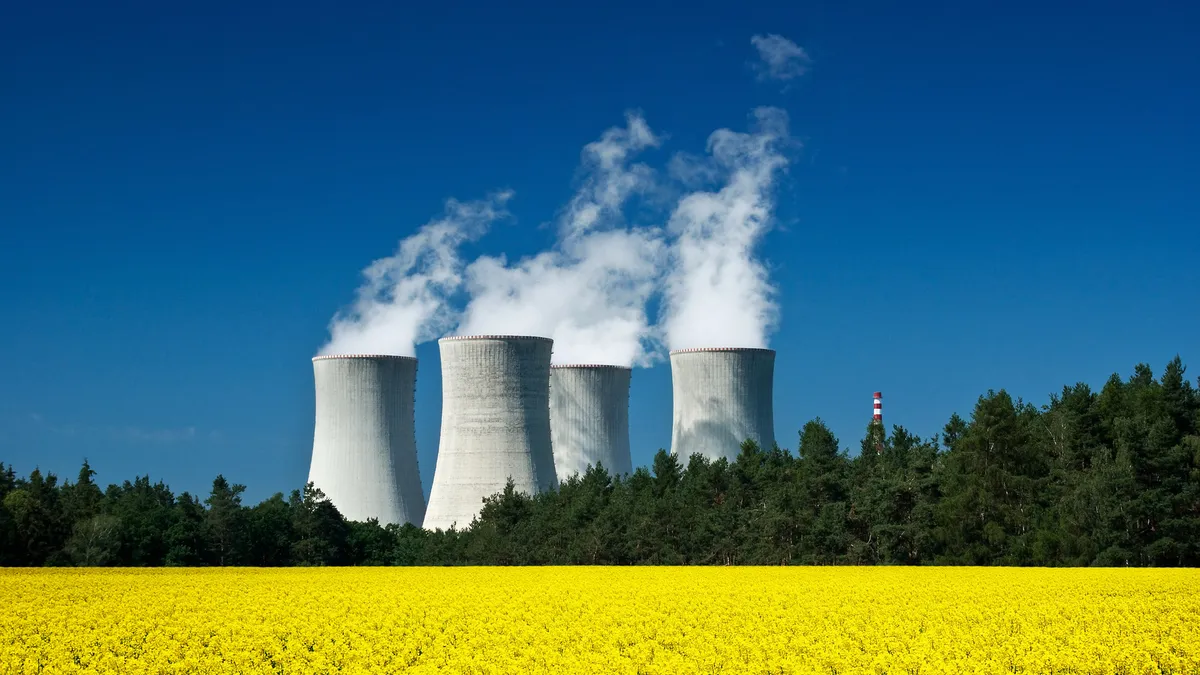Dive Brief:
- A new Nuclear Energy Institute report recommends a significant overhaul of how the U.S. Nuclear Regulatory Commission licenses reactors, arguing that the reviews have become slow, cumbersome and expensive in recent years. NEI sent its findings to NRC this week, following up on a January letter to the agency that warned of a need to streamline the regulation of advanced reactors.
- Small modular reactors (SMR) are one possible way to revive the nuclear industry, which has struggled to build new plants in recent decades. Earlier this year the NRC approved a key aspect of a new modular reactor being designed by NuScale Power, hinting at a future of faster permitting and construction of smaller resources.
- Backing the idea of smaller reactors, the Department of Energy announced 13 projects will receive approximately $60 million in federal funding for cost-shared research and development for SMR advanced nuclear technologies.
Dive Insight:
Large nuclear reactor projects have faced myriad issues and ran overbudget in recent years. The first new nuclear capacity in the United States in this century, Watts Bar Unit 2, was brought online by Tennessee Valley Authority in 2016. South Carolina has scrapped the V.C. Summer nuclear expansion, while Georgia is continuing on with an expansion of the Vogtle plant despite costing billions more than expected and taking years longer to complete.
But while there is diminishing interest in mammoth reactor projects, there is a growing belief that smaller reactors might be the industry's future. NEI's report highlights the need to streamline and scale back regulations along with nuclear developments.
The report, "Recommendations for Enhancing the Safety Focus of New Reactor Regulatory Reviews," concludes that while developers are working on "simpler and safer advanced reactor designs," the NRC has required the same level, or more, of detail in its licensing reviews.
"Without significant regulatory reform, U.S. advanced nuclear technology developers are likely to become discouraged about developing and deploying safer new reactor designs, putting at risk the future of nuclear technology in the United States and the nation's role as a leader in technology innovation," NEI said in a statement this week.
NEI's report comes as the NRC is considering how to tackle the new designs. Last month, NRC Chairman Kristine Svinicki laid out a six-step plan to reform her agency's regulatory approach for a new generation of advanced reactors.
The plan involves the development of new phased processes to review non-light water nuclear plants, such as SMRs, and to help industry develop new standards for the technologies. NRC will also develop collaboration plans with vendors and assist with community outreach, Svinicki said.
Secretary of Energy Rick Perry said in a statement on Friday that promoting early-stage investment in advanced nuclear power technology "will support a strong, domestic, nuclear energy industry now and into the future."
By far, the largest project tapped by the agency is the first phase of demonstration readiness by NuScale Power. DOE will provide a matched $40 million for the project, which will "conduct design finalization activities and ensure supply chain readiness to meet a commercial operation date of 2026 for the first NuScale plant."
NuScale submitted plans for its small reactor in Corvallis, Oregon in January 2017. Earlier this year regulators made a key determination: the standard for safety-related systems at most facilities, Class 1E power, was not necessary for the new design.
A final report on the design is expected in the fall of 2020. If approved, NuScale's SMR would be available for license in the United States.















